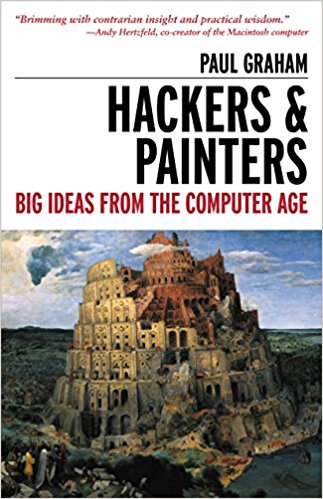Hackers and Painters Summary
6 min read ⌚
 Big Ideas from the Computer Age
Big Ideas from the Computer Age
As far as you’re concerned, the world of intellect is sharply divided between two kinds of people: the math nerds and the creative type. And there’s nothing similar between them since each group is interested in two entirely different things.
In “Hackers and Painters,” Paul Graham asks: “Oh, really!?”
Who Should Read “Hackers and Painters”? And Why?
One of the strangest questions you can ask when books such as “Hackers and Painters” are the topic of discussion.
It really feels like a centaur-book. Namely, the first half of it is more accessible and should be interesting to people who want to get to know with the hacker culture better. Since there are few start-up tips and tricks, entrepreneurs will have a reason to have a look at this part as well.
However, the second half is much more technical and will be much less attractive to non-professionals. Programmers and hackers, however, will enjoy it.
About Paul Graham
 Paul Graham is an English essayist and author, entrepreneur and CEO, computer scientist and philosopher. His broad interests and diverse skills have granted him the nickname “hacker philosopher.”
Paul Graham is an English essayist and author, entrepreneur and CEO, computer scientist and philosopher. His broad interests and diverse skills have granted him the nickname “hacker philosopher.”
Graham has so far co-founded Viaweb (which was eventually sold to Yahoo! and renamed Yahoo! Store) and Y Combinator, an American seed accelerator. His blog, paulgraham.com, is extremely popular among hackers and computer scientists.
He has authored two more programming books: “On Lisp” and “ANSI Common Lisp.”
“Hackers and Painters Summary”
Let’s warm you up with the first of our two simple tests.
First, picture a hacker. Did that?
OK, now imagine a painter. Done?
Finally, compare the two.
No comparison, right?
Because as few movies from the early age of computers taught us – yes, we’re mostly talking about the one which first made us dream of Angelina Jolie in a dress – hackers are mischievous video-games-addicted coders capable of breaking into any system imaginable.
You know, the guys you should be afraid of because, if they wanted to, they could steal all your money or sensitive photos in a blink.
Media coverage of the Pirate Bay trials, massive leaks of celebrity photos such as Celebgate, and people like Kim Dotcom certainly don’t help anyone change their perception.
As for painters – there’s an archetype there too. Still misunderstood, but an inspired genius, nevertheless, an eccentric profoundly interested in creating order out of chaos, beauty out of ordinariness.
Well, guess what?
Paul Graham, the author of “Hackers and Painters,” has a B.A. in Philosophy, a Ph. D. in Computer Science, and has also studied painting at the Accademia di Belle Arti in Florence.
And, as far as he’s concerned, hackers and painters are actually much more similar than hackers and mathematicians.
But you’ll probably understand the comparison better if you redefine the archetypal image of the hacker in your mind. And the proper definition of “hacker” may help.
Via Wikipedia: a hacker is an individual who enjoys “the intellectual challenge of creatively overcoming limitations of software systems to achieve novel and clever outcomes.”
Change “software systems” to, say, “visual media” and you get a definition of what it means to be a painter, don’t you?
Another thing painters and hackers have in common: both of them are usually unpopular in high school.
Why?
Well, because they are uninterested in things that are seasonal, be it fashion or morals. Some things change, they intuitively know, while others never do. And since they are smart, they choose to dedicate their time to the latter.
Can you blame them?
Sacrificing four years to insults and solitude for a lifetime of knowledge and a shot at immortality is worthwhile.
It’s you who are in the wrong.
Which brings us to the second test Paul Graham has prepared for you:
“Do you have any opinions that you would be reluctant to express in front of a group of your peers?”
We’ll quote you Graham’s answer in full:
“If the answer is no, you might want to stop and think about that. If everything you believe is something you’re supposed to believe, could that possibly be a coincidence? Odds are it isn’t. Odds are you just think whatever you’re told.”
Well, hackers and painters don’t. You may think of them as nerds or eccentrics, but actually, they are much more rebellious than you’ll ever be.
Originality, after all, is nothing more but an act of transgressing the limitations. If these are humanmade – i.e., the law – they aren’t perfect. So, it’s worth experimenting around them.
Painters do that.
Hackers do that as well.
And just a small number of the latter wear the black hat. The other, just like Picasso or Dali, are merely interested in the limitations of the systems which proceeded them.
Because the ways they can be hacked are actually the same ways which will improve them.
Key Lessons from “Hackers and Painters”
1. The Freaks and Geeks of the World: Painters and Hackers
2. Painters and Hackers Are More Similar Than You Think
3. It’s All About the Feedback
The Freaks and Geeks of the World: Painters and Hackers
In high school, there are at least two groups of people who don’t really belong anywhere. They are neither fashionable nor adhere to social conventions. And they are so focused on what they’re doing that they are sometimes too dull to even talk to them.
The first group consists of those peculiarly dressed art types who spend most of their math classes sketching things – since they don’t really care about equations.
The second, on the other hand, is comprised of math geniuses who know how to solve these equations the second they look at them.
The freaks and the geeks.
The interesting thing: Paul Graham is both.
Before you say “you must have had a difficult time in high school, Paul,” take a second and compare your life to Graham’s life at the present moment.
That’s right.
The freaks have inherited the earth.
Painters and Hackers Are More Similar Than You Think
At first glance, painters and hackers have nothing to share between them. After all, the least favorite subject of either group is usually the one the other group thrives in.
Artists are not good at math; oftentimes, hackers can’t really draw a straight line.
However, hackers and painters have much more in common than you’d think.
For example, as is most apparent, both are uninterested in fashion. A less obvious similarity between them is the fact that both think that morals are seasonal. Possibly even counter-intuitive (and, yet, true) both are more rebellious than both delinquents and jocks.
How?
Well, both are interested profoundly in how to transgress the limitations of a system. That’s why you usually think of hackers as criminals. And the reality is – if art composition rules were laws, Picasso would have been tried.
It’s All About the Feedback
Finally, both hackers and painters only are successful if they create something good. Or, in other words, something other people will like.
The end opinion is what matters.
That’s why it’s better to go through the trial-and-error test regularly. Whether a program or a painting – create it, see the reaction, and then improve it.
It’s worked for many.
It’ll work for you as well.
Like this summary? We’d like to invite you to download our free 12 min app, for more amazing summaries and audiobooks.
“Hackers and Painters Quotes”
There are few sources of energy so powerful as a procrastinating college student. Share on X Object-oriented programming offers a sustainable way to write spaghetti code. It lets you accrete programs as a series of patches. Share on X The recipe for great work is: very exacting taste, plus the ability to gratify it. Share on X The main reason nerds are unpopular is that they have other things to think about. Share on X In business, there is nothing more valuable than a technical advantage your competitors don’t understand. In business, as in war, surprise is worth as much as force. Share on XOur Critical Review
“Hackers and Painters” is one of the very few books of its kind – if not the only one. After all, there aren’t many people with Paul Graham’s background in the world, so not many can write a book like this.
However, Graham seems to forget that he’s the exception (and not the rule) which results in few flawed comparisons and forced arguments. And, truth be told, the book reads more like a collection of essays than a cohesively structured unit.
By the time you reach the end, you’ll wonder why isn’t the book called, “Lisp, the Language of the Future”? However, the writing style and the first half of the book makes up for it.
Or the other way around – if you’re a hacker.
Emir is the Head of Marketing at 12min. In his spare time, he loves to meditate and play soccer.


 Big Ideas from the Computer Age
Big Ideas from the Computer Age 




